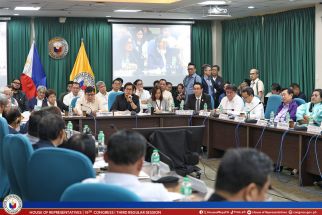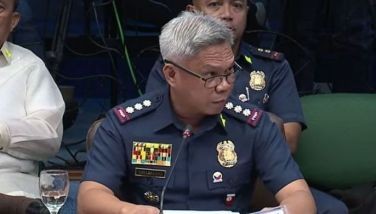Only 2 of 900 Pinoys in Iraq ask for repatriation
MANILA, Philippines - Only two out of about 900 Filipinos have chosen to leave war-torn Iraq and return to the Philippines.
Department of Foreign Affairs (DFA) spokesman Charles Jose said the two were employed at the US embassy in Baghdad.
They are scheduled to arrive home this afternoon, he added.
The DFA said most of the Filipinos in Iraq are based in Kurdistan, and that many of them are professionals.
About 152 Filipinos are working in Baghdad, the DFA added.
Jose said Filipinos in Kurdistan are instructed to restrict non-essential movements, avoid public places and take extra precautions.
“The DFA continues to closely monitor the political and security developments in Iraq,†he said.
The DFA has raised crisis alert level 1 for Kurdistan to Alert Level 2 (Restriction Phase), citing growing security threats.
On June 18, Philippine embassy representatives and the Rapid Response Team met with the Filipino community in Baghdad to discuss the general situation in Iraq, the new alert level and the measures being undertaken to ensure their safety.
Last week, the DFA raised crisis alert level 4 in Iraq due to the rapidly deteriorating security situation.
At crisis alert level 4, mandatory evacuation is undertaken at government expense.
“We continue to call on Filipinos in Iraq who are currently located in Alert Level 4 areas to contact the Philippine embassy in Baghdad and the Rapid Response Team to be repatriated as soon as possible,†Jose said
74 OFWs back from Libya
Meanwhile, 74 Filipinos arrived home yesterday after escaping the fighting in Libya.
Labor Secretary Rosalinda Baldoz said the first group of returnees numbered 67, followed by another batch of seven.
“The arrival of the 74 OFWs brought to 242 the total number of repatriates from Libya since the government ordered a voluntary repatriation,†she said.
Baldoz said more Filipinos availing of the government’s repatriation program are expected to come home in the next few days.
A majority of the returnees are men, she added.
She has directed new administrator Rebecca Calzado of the Overseas Workers Welfare Administration (OWWA) to intensify the provision of repatriation and reintegration assistance and services to returning workers from Libya and Iraq.
Calzado officially assumed her post yesterday.
She said her administration will prioritize programs for distressed and displaced overseas Filipino workers (OFWs).
“We are going to assist and help repatriated OFWs to become economically productive,†she said. “We will review and enhance programs for them.â€
Baldoz said the government is ensuring that OFWs affected by the instability and upheavals in other countries will be brought home quickly and safely.
“We are coordinating with concerned agencies so that airline tickets for distressed OFWs from Libya and Iraq can be issued within 48 hours,†she said.
Returning OFWs en route to the provinces will be offered temporary shelter at the OWWA Halfway Home in Makati.
They will be briefed on the government’s reintegration program for OFWs, specifically the “Balik-Pinay, Balik-Hanapbuhay†program.
Under the program, the DOLE holds skills assessment, business counseling and entrepreneurship development training for interested returning OFWs.
Gov’t stops sending HSWs to UAE
The sending of Filipino household service of workers (HSWs) to the United Arab Emirates has been temporarily stopped.
Baldoz said the government took the action after the UAE suspended the verification of contacts of foreign HSWs.
However, no deployment ban has been imposed, she added.
Meanwhile, Baldoz said the government has already lifted the ban on the deployment of Filipino workers to Thailand.
As the situation in Thailand returns to normal, the sending of Filipino workers will resume, she said.
Baldoz said the Philippine Overseas Employment Administration (POEA) will only stop the processing and deployment of UAE-bound Filipino HSWs with unverified employment contracts.
“The suspension of the verification of contracts of HSWs by the UAE is unfortunate,†she said.
“In this instance, the POEA will stop the processing of HSWs contracts for the UAE, like what we did when Saudi Arabia unilaterally suspended contract verification for HSWs.â€
Baldoz said the verification of contracts of OFWs has always been a requirement under Philippine law, as well as POEA rules and regulations.
“I am concerned that without the requisite verification, HSWs who will travel to UAE will be vulnerable to human trafficking, which we must avoid at all cost,†she said.
Baldoz said she has directed the POEA to work with the Bureau of Immigration (BI) and the Inter-Agency Council Against Trafficking (IACAT) to ensure that UAE-bound HSWs will not fall victim to human traffickers.
“The POEA and the BI should work together to strictly screen workers going to UAE on visit visas,†she said.
Baldoz said the POEA will launch a massive information campaign concerning deployment of HSWs to the UAE.
The POEA will not hesitate to close down recruitment agencies found deploying HSWs to the UAE without a Philippine Overseas Employment Office (POLO)-duly verified contract, she added.
Baldoz said she is confident that the UAE and the Philippines will eventually arrive at a mutually beneficial agreement on the employment of HSWs, similar to what has been concluded with Saudi Arabia.
The UAE has expressed interest to negotiate with the Philippines on the issue, she added.
Recruiters said POLO-verified employment contracts in the UAE are expected to run out in the next weeks.
Based on POEA data, the Philippines deploys between 10,000 to 30,000 HSWs to the UAE. – With Mayen Jaymalin
- Latest
- Trending































